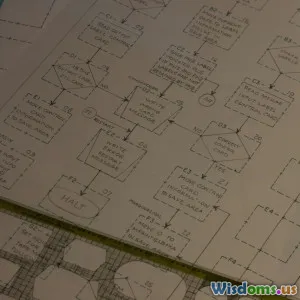
Enhancing Your Emotional Intelligence at Work
7 min read Boost your workplace success by improving your emotional intelligence with practical tips and techniques. (0 Reviews)
Enhancing Your Emotional Intelligence at Work
In today's fast-paced business environment, a high level of emotional intelligence (EQ) is not just helpful—it’s essential for personal success and company culture. With automation and artificial intelligence reshaping job roles, the ability to navigate emotions—both our own and those of others—has never been more vital. Have you ever wondered why some colleagues seem more effective in their roles, able to defuse conflict and inspire teams? The answer often lies in their emotional intelligence.
This article will explore how to enhance your EQ skills at work, giving you valuable insights and actionable strategies that can transform your career.
What is Emotional Intelligence?
Emotional intelligence is the ability to recognize, understand, and manage our own emotions while also recognizing, understanding, and influencing the emotions of others. Daniel Goleman, a leading expert in this field, defines it as encompassing five key elements:
- Self-Awareness: Understanding your emotions, strengths, weaknesses, values, and drivers.
- Self-Regulation: Managing and controlling your emotions in stressful situations.
- Motivation: Understanding what drives you and being motivated by internal factors.
- Empathy: Being able to connect with others and understand their emotional states.
- Social Skills: The ability to manage relationships, communicate clearly, and inspire others.
Why Emotional Intelligence Matters in the Workplace
Enhancing emotional intelligence can transform your career in several ways:
- Improved Communication: Teams with emotional intelligence tend to communicate more effectively, leading to more successful collaborations.
- Conflict Resolution: Individuals with high EQ skills can navigate difficult conversations and resolve conflicts more smoothly.
- Leadership Effectiveness: Leaders who exhibit high emotional intelligence can foster better morale, team dynamics, and employee satisfaction.
- Adaptability: Understanding the emotional currents in the workplace can help employees adapt to rapid changes, increasing organizational resilience.
- Stress Management: Greater EQ can lead to better coping strategies during challenging times—more important now than ever in a rapidly changing world.
How to Enhance Your Emotional Intelligence at Work
1. Develop Self-Awareness
Self-awareness is the bedrock of EQ. It means understanding your emotions and how they affect your interactions with others. To heighten self-awareness:
- Journaling: Regularly reflect on your thoughts and feelings; note patterns in your reactions to different situations.
- Seek Feedback: Constructively ask for opinions from trusted colleagues on your interpersonal skills.
- Mindfulness Practices: Engage in mindfulness meditation to help you become more aware of your emotional states in real-time.
Example: A manager regularly reflecting on feedback can note that they tend to raise their voice when meetings become stressful. By recognizing this pattern, they can take proactive steps to manage their reactions.
2. Control Your Emotions
Self-regulation involves managing your emotions and acknowledging them without letting them lead your decision-making.
- Pause before Reacting: Take a moment to breathe and reflect before responding in emotional situations. This can help defuse tension and lead to a more measured approach.
- Practice Emotional Retraining: Replace negative emotional responses with positive reframing. For instance, instead of being frustrated by a colleague's error, view it as an opportunity for dialogue and growth.
3. Cultivate Empathy
Being genuinely empathetic means recognizing and responding to others' feelings positively. Empathy can be nurtured by:
- Active Listening: Practice techniques such as rephrasing and summarizing what others say before responding, which shows you truly engaged with their concerns.
- Engagement in Diversity Training: Participate in workshops and training to better understand diverse emotional and cultural expressions.
Example: A project lead who actively listens to concerns from their teammates about project deadlines might develop strategies to redistribute workload more fairly, leading to happier, less stressed employees.
4. Enhance Your Social Skills
Social skills encompass abilities such as communication, conflict management, and relationship building. Enhance your social skills by:
- Building Relationships: Invest time in networking and developing friendships in the workplace. This deepens trust and promotes a supportive environment.
- Practice Conflict Resolution: Approach conflicts by focusing on finding solutions rather than assigning blame. Learn negotiation techniques to create win-win situations.
Example: In a tense staff meeting, fostering open dialogue about pressing issues can transform negative feelings into collaboration and team-building.
5. Foster Motivation
High emotional intelligence isn’t just about dealing with personal emotions; it’s about being motivated to achieve goals. Cultivate this:
- Set Personal Goals: Keep sight of what drives you professionally; aligning your tasks with your core values can enhance motivation.
- Recognize Achievements: Monitor your progress regularly, celebrating small achievements to maintain motivation.
Conclusion: The Future of Workplace Dynamics
Enhancing your emotional intelligence is a journey that requires commitment, self-reflection, and practice. Companies like Google and Microsoft invest in emotional intelligence training because they understand that fostering a high-EQ workforce strengthens collaboration and innovation. As organizations increasingly prioritize emotional intelligence, your ability to navigate these challenges is not only valuable; it’s essential.
As you work on enhancing your emotional intelligence, embrace the learning process. Building these skills can not only improve your work relationships but will also contribute to your overall career satisfaction and success. Remember, developing EQ is not a finite endeavor; it is a lifelong process that will require ongoing reflection, learning, and adaptation—in alignment with the evolving nature of work and human interaction.
Start today—your career and emotional well-being will benefit immensely.
Rate the Post
User Reviews
Popular Posts



















